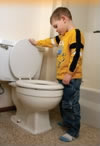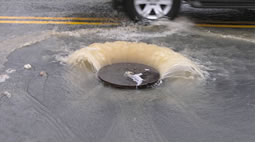what not to flush
Learn more about what not to flush down your drains.
Where does it go?
Do you ever wonder where the stuff you flush goes? Down the toilet or the drain isn’t the end of the line. When you flush water and unmentionables they have to go somewhere. For water to be released cleanly and safely into the environment most homes, businesses, industries, and institutional facilities connect to a sewer to convey flushed and drained wastewater to a treatment facility. Some things should never be flushed or sent down the drain because they cause problems. Do not use your toilet as a trash can!

Things that should never be flushed or drained:
- Paints and Solvents
- Gasoline or Combustible Fuels
- Toxic Chemicals
- Antifreeze
- Medicines and Pharmaceuticals
- Fats, Oils, and Greases
- Baby Wipes
- Flushable Wipes
- Needles and Razor Blades
- Pesticides, Herbicides, and Fertilizers
- Poisons including Rat/Mice Bait
Things that we should avoid sending to the sewer:
- Large amounts of food waste through the disposal
- Substances or objects that could plug a line and cause backups
For more information on how to dispose of household products, please click here .

Fat-free sewers
Fats, oils, and greases (FOG) aren’t just bad for arteries and waistlines; they’re bad for sewers too. FOG plugs and backs up sewer lines more than anything else. Grease and oil comes from cooking, meat fats, lard, oil, shortening, butter, margarine, food scraps, baked goods, sauces, and dairy products. Sending FOG down drains coats the surfaces of drain piping and sewers. FOG eventually builds up until it plugs the pipes and raw sewage can backup into your home or overflow into the street. Here are some ways you can help prevent that from happening:
- Never pour grease down a drain or into a toilet
- Put baskets/strainers in sink drains to catch food scraps and other solids and empty them into the trash can
- Scrape grease and food scraps into a trash can and avoid sending them down the drain or through the food disposal
- Restaurants should all have approved and maintained grease traps
FOG cannot be stopped by disposal units nor hot water and/or detergents that dissolve grease, they just move the problem down the system.

Help keep our drains drug-free
Every day the average adult uses nine personal care products that contain 126 unique compounds that could end up in our water. These include:
- soap
- shampoo
- conditioners
- toothpaste
- cosmetics
- medicines

These end up in the sewer when we bathe, shower, and use the bathroom. Analysis has shown the presence of compounds and drugs from these sources in streams and lakes. No current evidence shows that these trace chemicals pose a risk to human health; scientists have found some interference with aquatic organisms; Prudent control of what ends up in the water environment is important.
Please do not flush medications down the toilet! For information on how to dispose of medicine and prescription drugs, please click here to find drop-off location.
